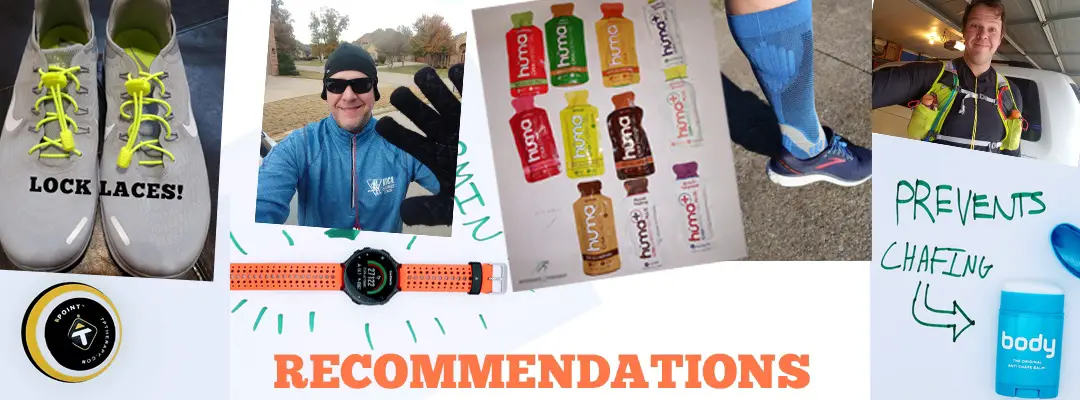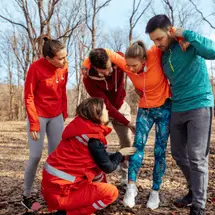Even the most practiced runners should prepare for any injuries that will need immediate attention. Whether you’re a road runner or stick to the trails, there are some essential things to bring on your run.
If you don’t have a first-aid background, you can still learn the basics and get the kit you need to prepare yourself for anything. Here, we list everything you may need and any extra tips. Read on for first-aid for runners – the ultimate guide.
What are Some Common Running Injuries?
Anything can happen on your run, but some injuries are more common than others.
Sprains and Strains
One misstep can lead to a twist of your ankle, and pushing yourself too hard can strain your muscles. Sometimes you can’t feel these injuries until a few hours or a day after your run. Uneven pavement can cause this kind of damage in the city, and trails are notorious for being difficult to manoeuver.
Related: 8 Common Running Injuries – Prevention and Treatment
Falling and Scraping Yourself
Some falls can contribute to sprain injuries, leading to open wounds and severe bleeding. It would help if you addressed any open wound as soon as possible. Otherwise, you can develop an infection that can further interrupt your running schedule.
Heat Stroke or Heat Exhaustion
Living in warmer climates can make your runs easier in a lot of ways: you don’t need extra layers or have to worry about ice. But heat can be just as dangerous if you don’t take proper precautions. Excessive heat can make you dehydrated, confused, and even dizzy, making sprain and falling injuries possible.
Related: Tips For Running In The Heat Safely
What Do Runners Need in Their First-Aid Kit?
All runners should start with a basic first aid kit. You can either buy a pre-set kit or build your own to your preferences. But, you should always include some things in your kit.
- Adhesive bandages
- Latex-free gloves
- Alcohol wipes
- Antibiotic ointment
- Hand sanitizer
- Any meds for a pre-existing condition
- Aspirin or another over the counter pain medication
- Scissors and tweezers
If you’re looking for an ultralight first-aid running kit that weighs less than 0.37 pounds (168 grams) – check out the Adventure Medical Kit (Amazon Link)
What Specialty Items Do Runners Need in Their First-Aid Kit?
Of course, there are more specialized items that you may want to carry in your first-aid kit.
- Self-adhering elastic bandage – you can use these bandages to wrap any unexpected sprains.
- Kinesiology tape (Amazon Link) – kinesiology tape works to stabilize injuries by applying pressure to inhibit muscle spasms. If you see a physical therapist, you may be familiar with the application techniques. Still, if not, there are resources to teach you how to use kinesiology tape with various injuries.
- Electrolyte drink – while running, you lose a lot of sugar and salt while you sweat. If you begin to feel dehydrated, water won’t be enough to replenish the lost minerals. Drinks with electrolytes with help reduce headaches and dizziness from dehydration.
- Isotonic tablets – an alternative to electrolyte drinks, and isotonic tablets can be added into your water-filled bottle for the same purpose.
- Sweatbands – if you run with an extra layer of sweatbands, they can double as a first-aid tool for cuts or scrapes. They can help stop the bleeding by applying pressure to the wound site.
- Blister plasters (Amazon Link) – way better than band-aids, blister plasters reduce friction and keep your blister from popping. Never burst a blister because it can introduce all kinds of bacteria and cause an infection. Your best bet is to use a blister plaster to prevent the skin from breaking.
Related: Ultimate Beginner’s Guide To Running In The Mountains!
Tips to Keep Safe on Your Run
You never know when an accident will happen when you run. It’s bound to happen eventually, and one wrong footfall can hinder you. The last thing you need is to be stuck somewhere, so there are some extra safety steps to take on your runs.
Bring a Running Buddy
If you need a friend to keep you accountable to your running schedule or know someone who loves running as much as you do, consider running together. This way, if anything happens to you (or them), there is someone there ready to help.
Always Have a Fully-Charged Cell Phone
Chances are, you’ll already have a smartphone on you. From tracking your workout to playing your music, your phone is in use throughout the entire run. But in case of emergency, your phone will be your lifeline.
You may need to call a friend to come to pick you up if you’re having trouble with your ankle or foot. Dropping a pin in your maps is a handy tool so the person you call can quickly locate you. And in a severe emergency, you will need to have a phone to call emergency services, like an ambulance.
Use a Trail Mapping App
Not only does an app give you precise distance and time to help you beat your personal bests, but they’re also a valuable safety tool. You can share your route and data with someone in real-time. If anything happens on your run, you can alert them.
If you’re a little weary of the technological route, just telling someone about what route you’re taking can be helpful. If you also share a check-in time, your friend or loved one can anticipate your call or text. Then if they don’t hear from you, they know to contact you and look for you in case of a debilitating injury.
Related: How To Prevent Injury During Marathon Training
How Can Runners Carry the First-Aid Kit?
You may be looking at the list of things you should carry in your first-aid kit and feel like it’s too much. Running is typically the most low-maintenance sport in terms of equipment. Even if you feel like a kit like this will weigh you down, there are some ways to get around any overloading yet still have everything you need.
Carry Your Kit in a Running Belt
A waist belt is an ideal accessory for runners. It’s a small pouch, but it can carry the things you need if properly packed. A waist belt is perfect because it distributes the weight on your body, and there are so many options at sport or running shops to find the most comfortable belt for you.
Carry A Running Backpack for Your Supplies
If you find having the belt compromises your performance, there are also small backpacks to carry everything you need. If you’re a fan of long-distance running, you probably already have a favorite. But if you’re unsure of what you may need, there are different sizes to choose from for your comfort.
Keep the Supplies in Your Car
Sometimes, all you need are the bare necessities on you for your run, but you should still keep a well-supplied kit at hand just in case. If you drive to a trailhead or your favorite park to run, keeping your first-aid kit in your car is an alternative to consider.
Related: 16 Tips To Run At Night Safely!
Final Thoughts
Runners need a little more than your basic first aid kit. Preparing for any muscle or ligament sprains and strains, open wounds, and heat-related injuries is critical for any runner. By keeping some more specialized items on hand, like kinesiology tape and isotonic tablets, you can mend yourself on the side of the trail if need be.
If you’re ever in doubt about what you should pack for your trail run or even city-run, use other runners as a resource. Even pharmacy members will be able to guide you to find everything you need for your first aid kit.
Meta Description
First aid for runners is something every runner needs to know. We answer the questions of what to include in your kit and much more.
| Help support me and subscribe to my YouTube channel. YouTube video - 30 ways to make your runs less painful! Coach Scott's Credentials:
|
To sign up for a FREE half marathon training schedule, log sheet, and pace predictor CLICK HERE.

Recommended gear for runners
Connect with me:
| facebook.com/BeginnerToFinisher/ |
References
https://www.theguardian.com/lifeandstyle/the-running-blog/2016/may/18/first-aid-for-runners

